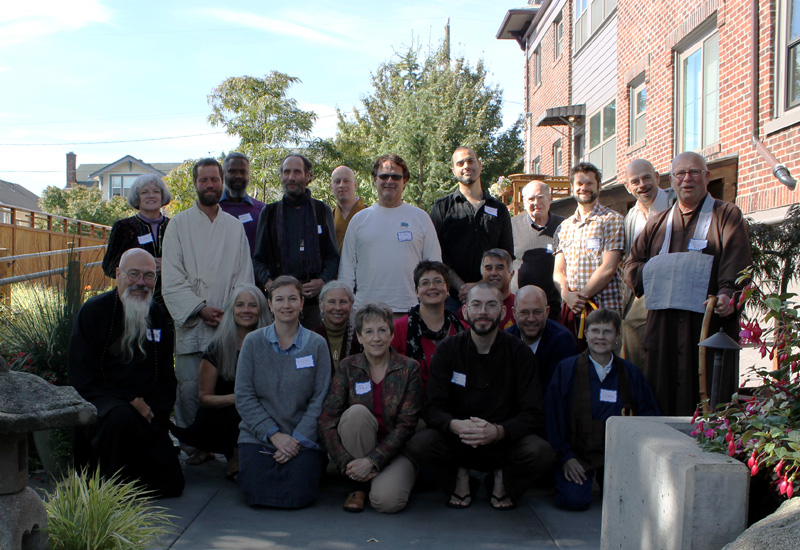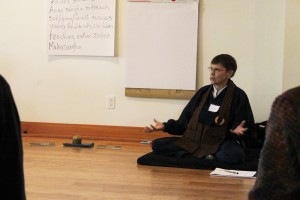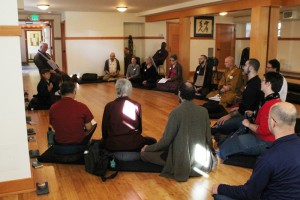Ethics, Technology, Explored at
Northwest Dharma Buddhist Teachers Meeting
Written by: Peg Evans Brown

The teachers gathered outside the Dai Bai Zan Cho Bo Zen Ji (Choboji) Zen temple in Seattle.
Northwest Buddhist teachers energetically explored a range of topics, including the role of ethics and coping with problem people in a sangha, at the 11th annual Teachers Meeting Oct. 5.
The meeting, coordinated by Northwest Dharma Association, was this year hosted by the Dai Bai Zan Cho Bo Zen Ji (Choboji) Zen temple in Seattle, and drew a wide range of teachers and monastics from around the Northwest.
Teachers attended from Choboji Zen Temple, D.I.Y. Dharma, EcoSangha, Mountain Way Zendo, Nalanda West, NOSangha, Open Gate Zendo, Plum Mountain Refuge, Portland Sakya Center, Sakya Monastery, Seattle Nichiren Buddhist Church, The Sunyata Group, Thurston Insight Meditation Group, Touching Earth Sangha, Vajra Body Vajra, Mind, White Cloud Buddhist Society, and Wisdom at Work.

Genko Kathy Blackman helped the teachers navigate some complex discussions.
The meeting was chaired by Genko Kathy Blackman, one of the two teachers of Choboji, who warmly greeted each visiting teacher as each entered through the lovely back garden. In true Zen tradition, each was instructed on where to place shoes, before given a brief tour of the zendo, kitchen and accompanying spaces.
Northwest Dharma Association board President Koro Kaisan Miles (who has now finished his term) thanked Blackman for facilitating and hosting the day’s meeting, and began by introducing himself and the other association representatives. These included then Vice President Tim Tapping (now president), board member Hadashi Jeff Miles, and association Administrator Timothy O’Brien.
Miles went on to explain that the purpose of the annual Teachers Meeting is to give the opportunity for Buddhist teachers from all the traditions in the region to get to know one another, to share their skills and experience, to discuss areas of mutual interest and concerns, and to develop relationships that would act as a support network of peers.
After introductions and a brief meditation, Blackman led the group in developing a list of topics for discussion. She posted recommendations on easel paper on the wall, and the group then set priorities for discussion. Proposed topics included ethics, finding students, Asian sangha outreach, sick/dying/ and death services, youth and children, teacher authorization, and of course, the relationship of mahasangha, the greater circle of dharma groups.
The lead topic of ethics kicked off a lively discussion about ethical behavior, focusing on the role of the teacher, and the need for honesty and openness in the sangha.

Sitting in a circle, about 15 regional dharma teachers explored a variety of subjects together at the annual teachers’ meeting.
There was consideration given to how culture impacts the life of the sangha. While formal ethical statements have been created by various sects, the conversation seemed to emphasize that healthy communities can be built and maintained best through open reflection within the sangha. Methods, including from 12-step groups and Marshall Rosenberg’s Non-Violent Communication Training, were offered as tools to help when groups get stuck.
Another discussion centered on “problem people,” defined as individuals who may be suffering from mental illness and/or other personality issues, which cause strife within the sangha. Suggestions for managing these situations included acknowledgement, inclusion, meeting criticism with openness, and reflecting with wisdom. Generally, participants endorsed dealing with issues compassionately rather than avoiding them. Maintaining safety for the group is an important consideration.
Other topics discussed and emphasized as important were: The cultural quality of how upper-middle-class whiteness prevails in many groups; culture matters that require sensitivity, skill, and creativity; environmental issues as part of our commitment to non-harming, and how Buddhist groups should be modeling the way in this regard.
Models for environmental sensitivity and inclusion are found in the Faith Action Network, and many sanghas are actively involved in environmental education and setting environmental goals. Participants emphasized that environmentalism is complex, and that there is a learning process to becoming better stewards of the planet. Remembering the practice of non-harm and renunciation can help us develop skillful means.
Long-distance communications with extended sangha members was also brought up as a topic, and was recognized as a modern method of inclusion and perhaps a necessity for rural areas. Several participants in the group shared success stories about using conference calls, e-mail, Skype and Facebook to include individuals unable to attend sangha regularly. Cyber sangha is becoming a more common practice for one-to-one and group interaction.
Ending discussions included how groups can embrace youth in the sangha, with the thinking that finding meaningful roles for of children and young adults will increase and enhance participation. Another topic of interest was the issue of offering services to people who are sick or dying, and the group agreed these should be topics for a future meeting.
The Teachers Meeting ended with everyone acknowledging and thanking Blackman for facilitating and Choboji for hosting the event, and also thanking Tapping and O’Brien for preparing a lovely lunch for the group.
